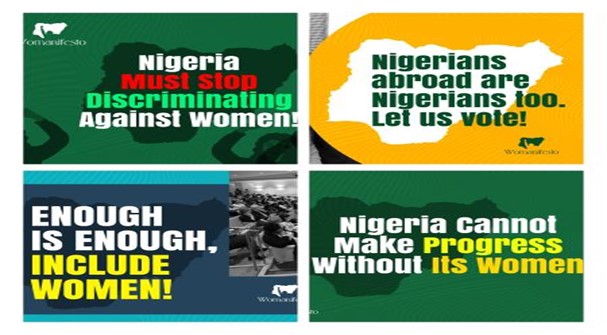[By Chioma Agwuegbo]
I woke up angry this morning; perhaps more tired than angry. No, not because we’re in the middle of the worst electricity situation we’ve experienced in a while, not because this is the fifth week of an utterly debilitating fuel scarcity; not even because the value of the naira continues to be diminished daily. No.
It is March 8th, International Women’s Day, the day set aside to celebrate the advancements and progress women have made and continue to make globally. The entire month is known as Women’s Month, dedicated to all things women.

UNESCO says, “International Women’s Day is an occasion to celebrate the progress made towards achieving gender equality and women’s empowerment but also to critically reflect on those accomplishments and strive for a greater momentum towards gender equality worldwide.”
And how did the world come across this particular day? First came the 15, 000 women who marched in New York in 1908 demanding voting rights, better pay, and shorter working hours, culminating in a National Women’s Day in 1909. Then came Clara Zetkin, a German socialist and fervent campaigner for universal suffrage, who came up with the idea of an international day for women. Clara suggested this at the International Conference of Working Women in Copenhagen in 1910 – “and the 100 women there, from 17 countries, agreed to it unanimously,” says WEF. The United Nations first celebrated International Women’s Day in 1975, and in December 1977, the General Assembly adopted a resolution proclaiming a United Nations Day for Women’s Rights and International Peace to be observed on any day of the year by Member States. Every year, there is a theme, and we celebrate. End of story.
So, a day of celebration, yes? Today no. Why? For as long as I can remember, March 8th is the date women in Nigeria are force-fed platitudes about how we are half the population, mothers of the nation, integral to nation-building, and without us, there would be no Nigeria. This spiel is spewed from all corners, from Mr President who (in)famously said, in response to a question about his wife’s criticism of his government, that “my wife belongs in my kitchen, in my living room, and in the other room,” to Senator Abaribe, who, speaking of his colleagues’ rejection of the Gender and Equal Opportunities Bill in 2016 said, “Some lawmakers started expressing deep worries about some parts of the bill that they think could give women too much freedom and lead them to prostitution, lesbianism and other social vices.”
It gets worse. Senator Ali Ndume is known for, on International Women’s Day in the same year, making a formal request to the Senate for Nigerian men to marry more women as a form of care. He said, “Men should take care of women by not just befriending them, but by going further to marry them. I know there is nowhere in the Bible that prohibits marrying more than one wife. Starting with the Senate President I ask him to consider marrying more than one wife. As a sign of respect for women, let’s urge men to marry more than one wife.” His counterpart in the House of Representatives, Majority Leader Alhassan Ado Doguwa, in January 2020, marched his four wives to the chambers to prove to his colleagues that he was powerful. “I have asked them to rise to respect the house on behalf of my family. And one other reason is to let you know that when members call me a powerful man, I am not only powerful on the floor of the house, I am also powerful at home because I deal with four wives. These four wives have produced 27 children for me and I’m still counting,” he said.
There are not enough words for Senator Yerima, a staunch opponent of the Gender and Equal Opportunities Bill, whose marriage to a child in 2009 made global headlines. Senator Yerima had divorced one of his wives, a 17-year-old, to make room for the 13-year-old. Or of Elisha Abbo, a recently elected Senator, now known for beating up a woman in a sex shop, in the presence of his security attaché. Abdullahi Ilelah, a male magistrate, despite video evidence, upheld the no-case submission filed by the lawmaker and dismissed the assault charge against him.
This National Assembly, on the 1st of March 2022, rejected all the gender bills before them as part of the Constitutional Amendment Review process. The bills would have allowed women to confer citizenship on their foreign-born husbands, provided for diaspora voting, 35% appointed positions, and another 35% affirmative action for women in political party leadership, provide specific seats for women in the National Assembly (there are currently 29 women out of 496), and allow women claim indigenship of their husband’s states. All of these received a resounding ‘no’ from both the Upper and Lower chambers of the National Assembly. This, despite several promises at the highest levels to correct the anomalies in our constitution that subjugate women.
So, today, the 8th of March 2022, before you listen to any platitudes parroting the #BreakTheBias theme for this year, think carefully about the circumstances within which Nigerian women have to exist. Think about how the game is currently rigged against women and girls at all levels. Think of the quality of representation Nigerian women have today. Think about the fact that women are out on the streets today across several cities in Nigeria demanding that we be recognised as full citizens of Nigeria. Think, and I hope it makes you angry too.
EiE Postscript: Today, March 8th, the House of Representatives rescinded their decisions on three women-related bills for reconsideration. They are the bills on citizenship, indigeneship and 35% affirmative action for women. We will continue to lobby to add diaspora voting to the bills being reconsidered. Please lend your voice by signing our petition: www.change.org/RecognizeDiasporansandWomen
 Chioma Agwuegbo is the Executive Director at TechHerNG and Convener of the State of Emergency GBV Movement. She writes from Abuja, Nigeria.
Chioma Agwuegbo is the Executive Director at TechHerNG and Convener of the State of Emergency GBV Movement. She writes from Abuja, Nigeria.
